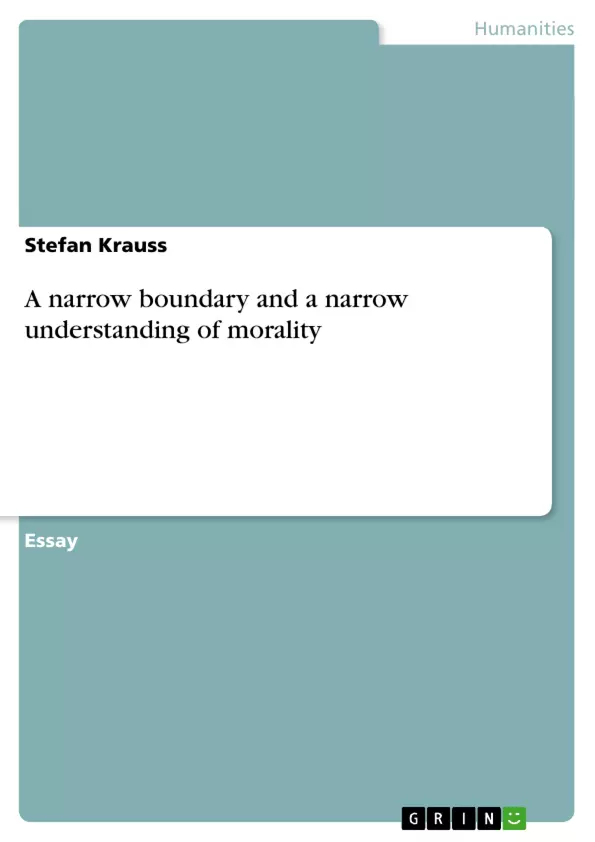A common moral attitude is that human beings, and only human beings, are members of the moral community and therefore humans are the only entities that are considered morally. In this essay, I will describe PETER SINGER′s argument that includes sentient beings in the moral community (ii; iii). Against this background I will criticize his approach and show some alternative readings of the argument in order to expand the moral community further (iv; v). PETER SINGER was born in 1946 and became Professor of Philosophy in 1977 at Monash University, Melbourne. With his influential essay "Animal Liberation" (1974) and the book of the same name published one year later, he counts undoubtedly as a pioneer of the animal rights movement and animal ethics.
Inhaltsverzeichnis (Table of Contents)
- (I) INTRODUCTION
- (II) The utilitarian BASIS: JEREMY BENTHAM (1748 - 1832)
- (III) SENTIENTISM: SENTIENCE AS CRITERION FOR MORAL CONSIDERATION
- (V) THE UNIVERSAL CHARACTER OF MORALITY: A HOLISTIC EXPANSION
- (VI) A PERSONAL STATEMENT: SINGER'S ARGUMENT IS AN EFFECTIVE STARTING POINT
- (VII) REFERENCES
Zielsetzung und Themenschwerpunkte (Objectives and Key Themes)
This essay examines PETER SINGER's argument for expanding the moral community to include sentient beings, drawing upon the utilitarian framework of JEREMY BENTHAM. It critiques SINGER's approach and proposes alternative readings of his argument to further expand the moral community.
- The utilitarian basis of moral consideration
- Sentience as a criterion for moral consideration
- Biocentrism as an expansion of moral consideration
- The universal character of morality and its implications for moral consideration
- The effectiveness of SINGER's argument as a starting point for moral discussion
Zusammenfassung der Kapitel (Chapter Summaries)
- (i) Introduction: This section introduces the common moral attitude that only human beings are members of the moral community and outlines the essay's aim to explore SINGER's argument for including sentient beings in the moral community.
- (ii) The utilitarian basis: JEREMY BENTHAM (1748 - 1832): This section explains the utilitarian foundation of SINGER's argument, highlighting the principle of equal consideration of interests as established by JEREMY BENTHAM.
- (iii) Sentientism: Sentience as criterion for moral consideration: This section outlines SINGER's central argument that sentience is the key criterion for moral consideration, as it signifies the capacity for suffering and enjoyment, which are prerequisites for having interests.
- (iv) The narrow baundary: A biocentric expansion: This section critiques the notion that only sentient beings have interests, proposing an expanded definition of 'interest' that includes all living beings, advocating for a biocentric approach.
- (v) The universal character of morality: A holistic expansion: This section argues that from a moral perspective, there are no conditions for moral consideration, and all beings should be considered, advocating for a holistic and unrestricted morality.
Schlüsselwörter (Keywords)
The essay focuses on moral consideration, sentience, utilitarianism, biocentrism, the universal character of morality, and the work of JEREMY BENTHAM and PETER SINGER. The argument centers around expanding the moral community beyond human beings to include sentient beings and potentially all living beings, challenging anthropocentric perspectives.
Frequently Asked Questions
What is Peter Singer's main argument regarding animals?
Singer argues that the moral community should include all sentient beings because they have the capacity to suffer and enjoy life, which gives them interests.
What does "Sentientism" mean?
It is the ethical view that sentience (the ability to feel) is the necessary and sufficient condition for having moral standing.
How does Singer use Jeremy Bentham's philosophy?
He builds on Bentham's utilitarian principle: "The question is not, Can they reason? nor, Can they talk? but, Can they suffer?"
What is "Biocentrism" as discussed in the essay?
It is a broader ethical view that suggests all living things, not just sentient ones, have inherent value and should be considered morally.
Why is Singer's "Animal Liberation" considered a pioneer work?
Published in 1975, it provided a philosophical foundation for the modern animal rights movement by challenging anthropocentric (human-centered) morality.
- Citar trabajo
- Stefan Krauss (Autor), 2004, A narrow boundary and a narrow understanding of morality, Múnich, GRIN Verlag, https://www.grin.com/document/28113



